email: info(at)go-eu.com
phone: +49 (0)89 90 42 23 60



assisted in a company setup.

We answer all your questions about a company setup Romania – free of charge and without obligation.
Inquire now
Over 500 successful foundings. Answer in 24h.
Or give us a call: +49 (0)89 90 42 23 60
(NEW: Company formation including bank account opening 100% remote)
Table of contents:
1.) 5 Steps: Company formation Romania
2.) Costs
3.) TOP 3 mistakes
4.) Who is it suitable for
5.) Our office locations
1.) Company incorporation in Romania in 5 steps
12 February 2026 21599 25Step 1: Choose a company type
Before starting a business, the first question is: What types of business structures exist? And what are their economic and tax implications?
Residence outside or in Romania - which company type should you choose?

Private companies such as general partnerships, limited partnerships or sole proprietorships require a residence in Romania and, in addition to corporate tax, also incur a social security tax—which is a significant factor when calculating total tax liability!
For founders with residence outside Romania, only a LLC - limited liability company (Romanian SRL) or Incorporation (Romanian SA) is an option.
The LLC is called SRL in Romania. This Romanian version of the LLC has a clear and adaptable organizational structure. It is also suitable for small and medium-sized companies that prefer limited liability and a straightforward organizational structure.

The SRL requires a written partnership agreement, which requires a notarial certificate. In this case, the share capital of EUR 1 is
almost irrelevant compared to the establishment of a Limited Liability Company. There are certain special situations of the SRL for which special regulations apply.
Step 2: Why Romania?
With only 1-3% corporate tax on a micro-enterprise, Romania has the lowest tax rate in Europe together with Bulgaria. This makes setting up a company in Romania the tax haven in the EU.
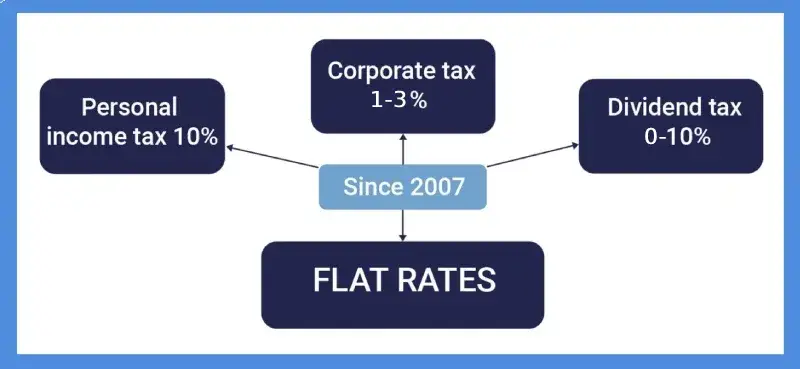
Low labor costs: Compared to most Western European countries, Romania is convincing due to its low labor costs. Romania is an ideal alternative location for your company if you are looking for highly qualified personnel but lack the budget for workers from more expensive countries. This is especially true for the production and IT sectors.
Stable tax policy: A stable and consistent tax policy: Romania has a solid tax policy. This helps to provide confidence to companies planning long-term investments and that depend on a predictable tax environment.
Low cost of living: If you are not only thinking about running your company in Romania but also want to live in the country, you will benefit from low living costs.
➼ Further information:
➔ Latest Taxes in Romania: Tax Rates 2026➔ Residence in Romania: Work permit Romania
➔ Business Romania: Business in Romania as a foreigner
Step 3: Requirements for founding a company
In order to establish a company in the form of an SRL, the following questions arise: Is it possible to establish a company without having to travel? What documents must be submitted?
The Romanian company must be notarized - do I have to go to a notary in my home country or even in RO?
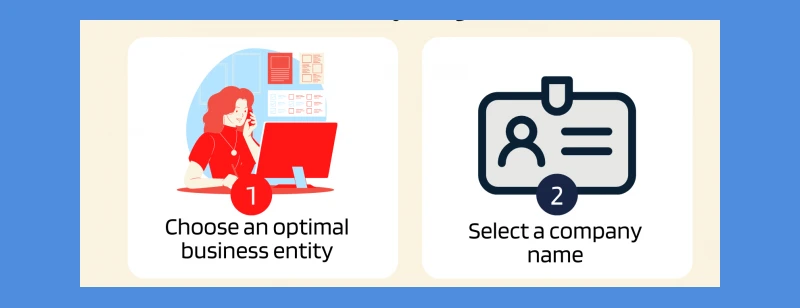
Starting a business remotely, without having to travel at all, is often not entirely possible! - But with GO EU it is definitely possible!
Many providers promise to set up a company without any local notary appointment. In reality, a notary appointment in the country of residence is often necessary. The notarized documents then have to be provided with an apostille, which is a laborious process.
Upon opening an account or authorizing the tax advisor, a physical notary appointment on site is required, contrary to what was previously promised!
--> Exclusively at GO EU -Company formation, account opening and tax advisor authorization 100% remote and without physical notary appointment possible!
We answer all your questions about a company setup Romania – free of charge and without obligation.
Inquire now
Over 500 successful foundings. Answer in 24h.
Or give us a call: +49 (0)89 90 42 23 60
(NEW: Company formation including bank account opening 100% remote)
Company formation process:
- The share capital must be at least 5 Lei (1 euro)
- Payment of the share capital
- Articles of association authorised by a lawyer / notary
- Checking and applying for the company name
- Preparation of the founding documents
- Registration in the Romanian Commercial Register
- Notarial certification
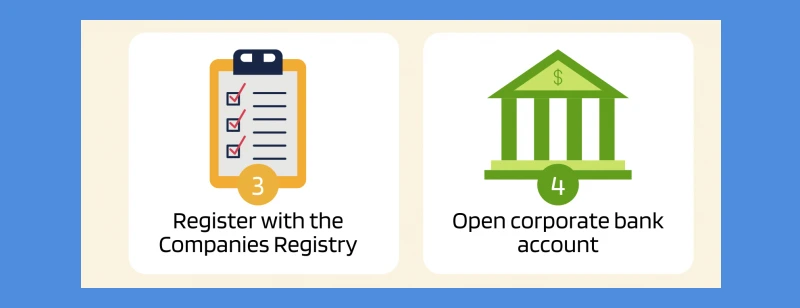
Required content:
- Determine the amount of share capital
- Specify the company's object and business purposes
- Allocate shareholder shares
- Establish the company's registered office
- Define the Rights and Obligations of the Shareholders
2.) Costs / Prices
The prices for setting up a company depend on a number of factors. Are there additional costs for travelling to Romania for company registration or opening a bank account? In the best case scenario, no travel is necessary at all and all services can be carried out 100% remotely. The standard company setting up costs are around EUR 2,000. The costs of establishing a company with GO EU include:
- ✅ Complete remote incorporation
- ✅ Founding & Name Registration
- ✅ Lawyer & notary fees included
- ✅ Commercial register entry
- ✅ Receive original certificate of incorporation
- ✅ VAT ID, Bank Account Opening remotely
- ✅ Support from English-speaking employees
- ✅ Own Romanian accountants
Company Formation & bank account only at GO EU 100% remote! - But what are the additional costs?
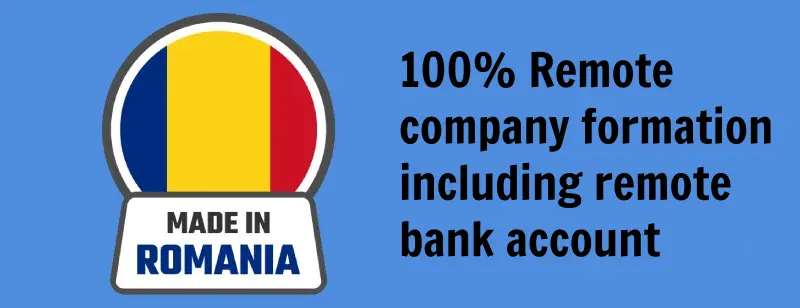
We answer all your questions about a company setup Romania – free of charge and without obligation.
Inquire now
Over 500 successful foundings. Answer in 24h.
Or give us a call: +49 (0)89 90 42 23 60
(NEW: Company formation including bank account opening 100% remote)
Additional costs: company address with mail forwarding, VAT ID application, bank account opening, as well as monthly accounting and annual financial statement fees.
Attention: Tax consultant fees are often expensive, as in Eastern
European countries such as Romania a lot of accounting is still done manually.
Accounting costs typically start at 250 EURO per month plus additional fees for annual financial statements.
Attention: Even poorly trained tax consultants—or even large tax firms where no one is available in urgent situations—still charge these prices.
--> Exclusively at GO EU - Access to our own tax advisors and English-speaking employees included at a fixed price! (Costs well under 250 EURO per month)
Step 4 and 5: Choosing the right start-up agency and structure
Self-employed people and entrepreneurs benefit from the advantages of setting up a company in Romania, including a low corporate tax rate of just 1-3%, a low wage structure and a stable tax policy. The economic opportunities and the geographical proximity to the European market, despite bureaucratic obstacles, language barriers and cultural differences, make Romania an extremely attractive location with the right local partner.

We answer all your questions about a company setup Romania – free of charge and without obligation.
Inquire now
Over 500 successful foundings. Answer in 24h.
Or give us a call: +49 (0)89 90 42 23 60
(NEW: Company formation including bank account opening 100% remote)
Anyone who has ever thought about starting a company in Romania has most likely noticed the very low taxation in the country, or the low wage level for hiring employees. Compared to Western countries, only a third of the costs are incurred and that is for qualified permanent employees.
The challenges you may encounter, whether you set up your company remotely from your home country or relocate to Romania. Let's clarify the 3 biggest mistakes that can occur when setting up a company in Romania:
10 Minutes initial consultation, 100% free.
Inquire Now
Call us: +49 (0)89 90 42 23 60
(NEW: Company formation including opening a bank account 100% remote)
1st Mistake: Founding a company without employees
If you choose not to employ permanent staff, you will automatically be subject to a 16% tax on your profits.

Hiring a permanent employee (minimum salary 800 EURO gross)
has 3 advantages:
Advantage 1) In Romania the salary level is about 3 times cheaper than the average European salary.
This means hiring well-trained staff at a third of the price – with employees also providing real added value.
Advantage 2) By employing the business management with a stated salary, nothing stands in the way of recognition by the authorities
Advantage 3) As a reward, in Romania, if you have one or more employees, you only have to pay 1% tax on the total company turnover. So it's almost tax free.
2nd Mistake: setting up a company locally
Most start-up agencies offer company formations in various countries. However, this comes with a major drawback: you can only truly excel in one area. An agency that operates like a one-stop shop for company formations worldwide may achieve greater reach, but often at the expense of quality execution and support.

Normally, two notary appointments must be arranged locally in your country of residence. A sworn interpreter from the Romanian embassy is mandatory for the notary appointments.
ONLY AT GO EU:
We have a high-ranking lawyer with notarial authority who can replace an on-site notary appointment, meaning that the entire incorporation process can be carried out remotely without travel. However, after your company has been founded, we recommend a one-time trip to Bucharest, Romania, to arrange for an account to be opened at a Romanian bank.
3rd Mistake: Bad tax advisor
Looking back on our many years of experience, one of the biggest challenges we faced in our early days in Romania was poor accounting services and the resulting tax complications. We had signed mandates with numerous well-known Romanian tax firms, but the outcome was consistently disastrous.

A senior chief accountant would likely have handled it well, but due to the low wage structure, you almost always end up with employed accountants who lack sufficient expertise and make serious mistakes. This is not meant as a criticism, but in the end, it always proves to be very costly.
At GO EU, we are proud to have a state-registered tax advisor in Romania who works almost exclusively for our clients. He has a deep understanding of international tax law, proactively informs them about tax changes, and strategically develops the company roadmap in collaboration with our clients.
We answer all your questions about a company setup Romania – free of charge and without obligation.
Inquire now
Over 500 successful foundings. Answer in 24h.
Or give us a call: +49 (0)89 90 42 23 60
(NEW: Company formation including bank account opening 100% remote)
This article is intended to provide insight into who would benefit from starting a company in Romania
What advantages Romania really offers in terms of location (company headquarters in Romania), employment costs, requirements and taxes.Since we deliberately focus on the tax aspects and their benefits, we encourage you to watch our video above. It covers everything you need to know about tax savings when establishing a company in Romania. For a detailed breakdown of taxes, refer to the lower section of this report.
We answer all your questions about a company setup Romania – free of charge and without obligation.
Inquire now
Over 500 successful foundings. Answer in 24h.
Or give us a call: +49 (0)89 90 42 23 60
(NEW: Company formation including bank account opening 100% remote)
Is it worth setting up a company in Romania, and who would benefit from it?
We explicitly focus here on the micro-enterprise regime, as companies with annual turnover of up to 100,000 EUR are taxed at only 1–3% on turnover. Even above an annual turnover of 100,000 EUR, it can still be advantageous to establish a company in Romania, as profits are then taxed at 16%, which is still significantly lower than in Germany, where corporate taxation is around 30% (corporate income tax and trade tax).
The following annual turnover is considered ideal:
2025: Below 60,000 EUR (300,000 RON) annual turnover
(small business regime with VAT exemption –
by comparison: Germany 25,000 EUR)
2026: Below 80,000 EUR (395,000 RON) annual turnover
(small business regime with VAT exemption –
by comparison: Germany 25,000 EUR)
Increase planned for 2026:
This equals approximately 6,500 EUR per month without VAT!
The huge advantage! You no longer have to constantly worry
about which expenses you can still deduct for tax purposes.
Instead, you can focus on your business rather than generating unnecessary
expenses “for the tax office” – and simply let profits remain profits.
The following types of entrepreneurs benefit the most:
- YouTubers, streamers, etc.
- Instagram and Facebook influencers
- Content creators
- Freelancers
- Coaches and consultants
- Digital service companies (SEO, advertising, and social media agencies)
- Sellers of digital products
- Local service businesses (craftsmen, car repair shops, hairdressers, and more)
- E-commerce (including Amazon FBA and dropshipping)
- Financial service providers
- Real estate businesses in general
- Recruitment agencies
- Manufacturing businesses
- and many more.
Romania as a Business Location
Romania is located in Southeastern Europe with access to the Black Sea and has been a member of the European Union since 01 January 2007.
With a population of over 20 million people, approximately 37 million hectares of agricultural land, breathtaking landscapes, a growing economy, well-educated labor force with more than 50,000 specialists in information technology, as well as access to the Black Sea and Asia, Romania offers significant opportunities for foreign entrepreneurs.

After joining the European Union in January 2007, Romania underwent a series of governmental reforms to meet the conditions of EU membership. Today, these membership requirements—including EU directives —remain one of the key driving forces behind Romania’s reform program, focusing on modernization and infrastructure investment. More importantly, these directives are supported by EU funding, including structural adjustment funds and various programs that help new member states align their economies with the rest of the EU.
Romania is a market with excellent potential, a strategic location and an increasingly solid business climate. With a GDP growth of 4.8% in 2016, the economy is among the fastest-growing in the EU - an impressive 6.9% for 2017 and 4.1% for 2018 - mainly driven by consumption and investment.
Employment costs
Income tax on income from salaries is governed by the Tax Code (Law 227/2015). Income tax for natural persons is only 10%!
The assessment basis for social security and health insurance of an employee in
Romania is derived from the amount of the salary.
The following taxes apply on the employee side:
10% income tax for employees
10% health
insurance contribution
25% pension contribution
Employer share:
2.25% unemployment insurance
-> Simply put, there are 35% in contributions plus a 10% income tax (wage tax) for employees, which are deducted between gross and net wages.

In Romania, a statutory gross minimum wage is required according to EU regulations. From January 1,
2025, this will be 4,050 RON (approx. €800).
Requirements for establishing a Romanian SRL
Below are the generally necessary documents for the establishment of an S.R.L. (LLC):
- three different names for the company. After checking availability, a company name will be chosen.
- Articles of association drafted by a lawyer/notary
- Company headquarters – rental agreement for
company address
- Signature sample of the managing director created by a notary or directly at the
commercial register
- Criminal record or submission of a written declaration that there are no
criminal records
- ID / passport copy of the managing director / shareholders
- Proof of deposit
of share capital – in this sense, a share capital account is opened before the company is registered.
The share capital for an S.R.L. is currently 200 lei
- Affidavit of the managing director prepared by
a lawyer / notary
- Application for company registration
- Application
for VAT registration
- optional:
Open a bank account
- optional: Authorization of an accountant/tax office by a notary
Our office in Romania
➼ More Information:
➔ About us: The Team behind GO EU➔ Contact: Contact and Locations
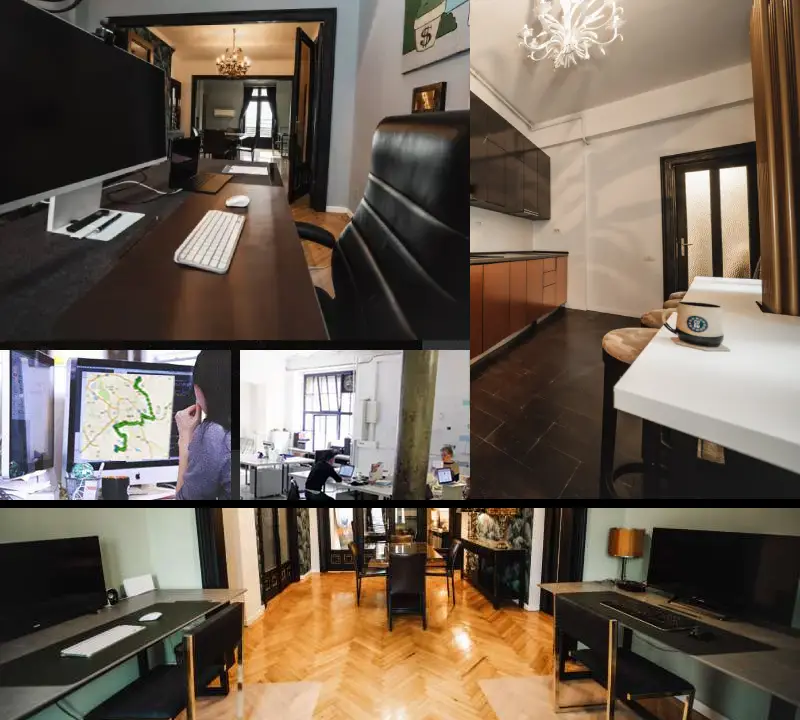
Company headquarters in Romania
GO Services Managemet SRL
Boulevard Regina Elisabeta 44
030167 Bucharest
Sector 5
Romania
Fiscal Code: 49478386
EUID number: ROONRC.J40/1561/2024
Registry number.: J40/1561/2024
Internet: https://www.go-eu.com
email: info (at) go-eu.com
phone DE: +49 (0)89 90 42 23 60
phone RO: +40 (0)758 475 461
➼ Further information:
➔ Latest Taxes in Romania: Tax Rates 2026➔ Residence in Romania: Work permit Romania
➔ Business Romania: Business in Romania as a foreigner
➔ Founding Costs Romania: Company formation costs
➔ Move to Romania: Moving to Romania 2026
We answer all your questions about a company setup Romania – free of charge and without obligation.
Inquire now
Over 500 successful foundings. Answer in 24h.
Or give us a call: +49 (0)89 90 42 23 60
(NEW: Company formation including bank account opening 100% remote)

Dieter Kuhn
Published on 05 February, 2020 / Answer
Great report! I started a company in Bulgaria a year ago through a formation agency I found on Google. Price-wise, it seemed like the best deal, but over time, hidden costs and extra work kept piling up—things that were completely concealed from me. Looking back, I would have preferred to travel to the country for a few days and handle everything in person. The notary appointments in Germany, along with sworn interpreters, were expensive and required a huge effort, plus everything had to be apostilled. No thanks. Never again -.-'
Thomas Hofmann
Published on 05 February, 2020 / Answer
Hi Dieter, we would like to thank you for your praise and trust. Even if you stay with your company in Bulgaria, I hope that I was able to answer your questions or tax questions in the EU. If you need help again, we would be very happy to hear from you.
Thomas
Published on 14 February, 2020 / Answer
I was aware that many companies founded abroad or so-called offshore companies shut down after a short time, but I find the 90% figure a bit exaggerated. That being said—people, do your research! Many formation agencies are just looking for a quick sale, have little to no knowledge of tax matters, and leave you with an unfinished puzzle, forcing you to figure out where your company stands—let alone whether it will ever be fully operational.
Joachim R.
Published on 21 June, 2020 / Answer
Nothing new, really! Every medium-sized company has additional branches, whether within the EU or beyond. Properly managed establishments in Germany, Italy, Spain, for example—plus a company in Romania. Properly managed branches in Germany, Italy, Spain, for example - and then a company in Romania. Why should you pay double taxes? Otherwise nobody would be able to afford it. Pay attention to the double taxation agreement and comply with it-simple as that! That being said, the incredibly low 1% tax rate is certainly interesting. Chapeau!
Kessler Lorenz
Published on 08 August, 2020 / Answer
Google the double taxation agreement between Germany and Romania—it outlines everything that needs to be considered and how it works. You can live in Germany while taxing company income exclusively in Romania via an SRL! A great example is owning a condominium in Romania —rental income is taxable only in RO and not again in DE. Residence and main place of living remain in Germany. However, I’m unsure to what extent this applies to different business activities. Does anyone have more insights?
Markus
Published on 10 August, 2020 / Answer
The company's activities must be reflected in the DE-RO double taxation agreement. This lists in catalogue form which areas apply in order to avoid double taxes. Anyone who strictly observes this is on the safe side.
Huber Stallinger
Published on 25 September, 2020 / Answer
OK, sounds promising. OK, let's assume that works and I only pay taxes on my income in Romania and none at home. This is at the business level. What if I then want to pay something out privately? (Withdrawal)
AntiCoron
Published on 30 September, 2020 / Answer
In Romania, you pay 5% dividend tax for private withdrawals into your private account. That's it.
Julia
Published on 02 October, 2020 / Answer
Is it even possible to start a company in times of Corona?
Thomas Hofmann
Published on 02 October, 2020 / Answer
Hello Julia, yes, we continue to set up companies locally in Bucharest with our clients. The offices are a little understaffed at the moment, but the processes are continuing and running smoothly. You can currently travel to Romania for 72 hours - without having to go into quarantine when entering and leaving the country. This is purely for business purposes. After your departure, one of our employees on site will complete the company opening with the help of a notarized power of attorney until it is completed. This means that a 2-3 day stay is sufficient for a successful company establishment.
Rico R
Published on 14 August, 2021 / Answer
I would like to have you assist me in setting up my company. How do I go about it?
Thomas Hofmann
Published on 15 August, 2021 / Answer
Hello Rico! We're delighted. We ask you to simply leave your details on the contact or inquiry form and we will contact you immediately. Alternatively, just call us directly! It's the quickest way and we're usually available! We look forward to hearing from you. Have a nice Sunday.
Stephanie
Published on 28 December, 2021 / Answern
Would it be possible to set up a company in Romania in the new year? I would like to come to Bucharest at the beginning of January. Would that be possible?
Thomas Hofmann
Published on 28 December, 2021 / Answer
We will be back in business from January 4th. Arrival would be possible from this date. We look forward to hearing from you!
Dimitri
Published on 02 November, 2022 / Answer
How long does it take to set up a Romanian company?
Thomas Hofmann
Published on 02 November, 2022 / Answer
Hello Dimitri, thank you for your inquiry. The incorporation process usually takes 10-14 days. A 2-day journey to Bucharest is sufficient.
Georg Staller
Published on 03 November, 2022 / Answer
Can I start a business remotely without having to travel?
Thomas Hofmann
Published on 02 January, 2023 / Answer
Yes, it is possible to set up a company remotely. Normally, a notary appointment is required. Two notary appointments must be arranged in your country of residence. A sworn interpreter from the Romanian embassy is mandatory for the notary appointments. ONLY WITH US: We have a high-ranking lawyer with notarial authority who replaces a notary appointment on site, i.e. the entire establishment can be carried out remotely without having to travel. We recommend that you travel to Bucharest 1-2 working days after your company has been founded in order to take your original company documents with you, get to know us and our accountant - and also order an account opening at a Romanian bank. Opening an account at a local Romanian bank is not possible remotely.
Erwin E.
Published on 15 September, 2024 / Answer
I'll get in touch with you! My startup is launching and I'd like to open it in Romania.
Otto
Published on 15 January, 2025 / Answer
The only website where the tax changes are also currently published for 2025
Antoni
Published on 18 March, 2025 / Answer
Tried setting up online banking after opening the account, turns out I still have to go to the branch for every little thing. Not exactly ideal for remote work. Was this just my case? Or did anyone experience the same?
Jesko
Published on 03 July, 2025 / Answer
Bank account opening can be done remotely through a procura with a notar, otherwise Revolut or Wise works fine too.
Jesko
Published on 01 November, 2025 / Answer
2026 will be some changes in Romania.
Jesko
Published on 06 December, 2025 / Answer
2026 its still 10% income tax in Romania. Go with that instead corporate companies.
Jesko
Published on 19 February, 2026 / Answer
To the income tax comes CAS and CASS costs additional